
Transcription
POWER
Wednesday
January 6, 2016
I subscribe to a periodical that requested submissions about power, how it related to prisoners, how prisoners obtained it, etc., and this is what I came up with. After reading it, I felt like sharing it...
For the most part, prisoners lose all power, real or imagined, the moment the sally port gates close behind their transport. Guards run around, screaming and shouting senseless orders, not because the tasks are necessary, but because protocol demands that we be broken as quickly as possible, while at the same time showing us that, regardless of what we may have been told, they're the ones running the show. Our every move is dictated to us by an unfeeling collective dedicated to supporting even the dumbest decision made by one of their own, especially if it involves a need to respond violently. We're told what to wear and how to wear it, when we can eat and what we can eat, even when we can use the bathroom and how much privacy we're afforded while using it. For most of us, once he initial shock wears off, we respond by trying to acquire whatever power we possibly can, and in the process of doing so, our humanity. While some are able to acquire a measure of power during their time spent in processing, for the most part, we exit the reception centers and head towards our final destination with little to no real power whatsoever.
Power is subjective, at best. The very thing which makes us appear powerful in one situation or set of circumstances may, in another, make us appear weak or vulnerable, powerless. For instance, if you lived miles away from the nearest body of water and your only mode of transportation was a canoe, then your neighbour, who has a driveway full of vehicles to choose from, would look pretty powerful indeed, but take that same situation and add a flood to the equation, and all of a sudden the balance of power shifts. With all of his vehicles submerged, you, and your canoe, are now perceived as powerful. In prison, though, this subjectivity is even more intense, albeit incomprehensible. Knowing nothing more about each other beyond the committing offense(s), if that, a new power structure evolved, a hierarchy based on the heinousness of our offenses, and contrary to what Law and Order: Special Victims Unit would have you believe, sexually based offenses, while looked down upon, are not the most heinous offense in prison. That distinction goes to murderers, and the more violent the murder, the more power that person is perceived as having. As power is subjective, it becomes necessary to continually demonstrate both the willingness, and capability, to act in a manner consistent with how this position of power was achieved in the first place, which usually involves repeated acts of violence.
Fortunately, there's another, more effective, way of obtaining power which doesn't involve the use or threat to use violence. I refer to knowledge because "knowledge is power." Even the weakest individual is perceived as having power when (s)he possesses important knowledge that others don't and need. "Knowledge is power," and nowhere is this more apparent then a courtroom, where even the most powerful criminal turns to his attorney for help avoiding punishment.
More often then not, power obtained through the use of violence dissipates exponentially as it's shared, but power obtained through the acquisition of knowledge has the reverse effect. For starters, sharing knowledge places you in a teaching position, which, by its very nature, places you in a position of power over your student, which is why even adult administrators are forbidden from engaging in relationships with their students. At the same time, there are many situations in which knowledge possessed and employed by numerous people operate more effectively then knowledge possessed and employed by an individual. This is why unions are so effective, why protests don't succeed if they don't involve large groups of people, and why class action lawsuits stand a better chance of success. This concept is no less effective in prison, but sadly, the inmates who do have the knowledge usually don't like sharing it for fear that doing so diminishes their perceived level of power. Because of this, there are fewer people with the knowledge required to challenge the system's systematic elimination of prisoner's rights, hence, the importance of sharing your knowledge, thereby increasing your power, and more importantly, the power of your position.
Some people argue that it doesn't matter one way ot the other how you achieve power, especially in a prison setting, so long as you do. However, the argument fails to take into account the consequences, good and bad, of the methods employed to obtain that power. For example, power obtained through the use of violence not only means restrictions against the offender, it also means increased restrictions directed towards people who weren't even involved as officials strive to stop future acts of violence. Power obtained through the acquisition of knowledge, however, usually mean that the person possessing the knowledge also possesses the ability to employ it responsibly, in a manner that promotes achieving their goal without a loss of life, rights or privileges.
They say that "hindsight is 20/20," but hindsight, by its very nature, means that the damage has already been done. By the time we look back, we've already violated the rights of more people then we can count, and in the process of doing so, we've become a slave to the power we sought, instead of the other way around. Some of us are fortunate enough to learn this lesson before it's too late, but for others, we die full of regrets, unable to control the monster we've become.
Shawn L. Perrot CDCR# V-42461
MCSP Cell# C-13-219L
P.O. Box 409060
Ione, CA. 95640
Other posts by this author
|
2020 aug 12
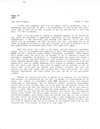
|
2020 aug 12
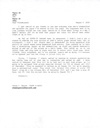
|
2020 may 30
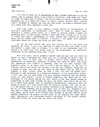
|
2020 may 30
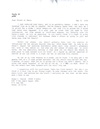
|
2020 may 30
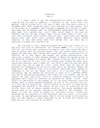
|
2020 may 24
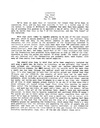
|
More... |
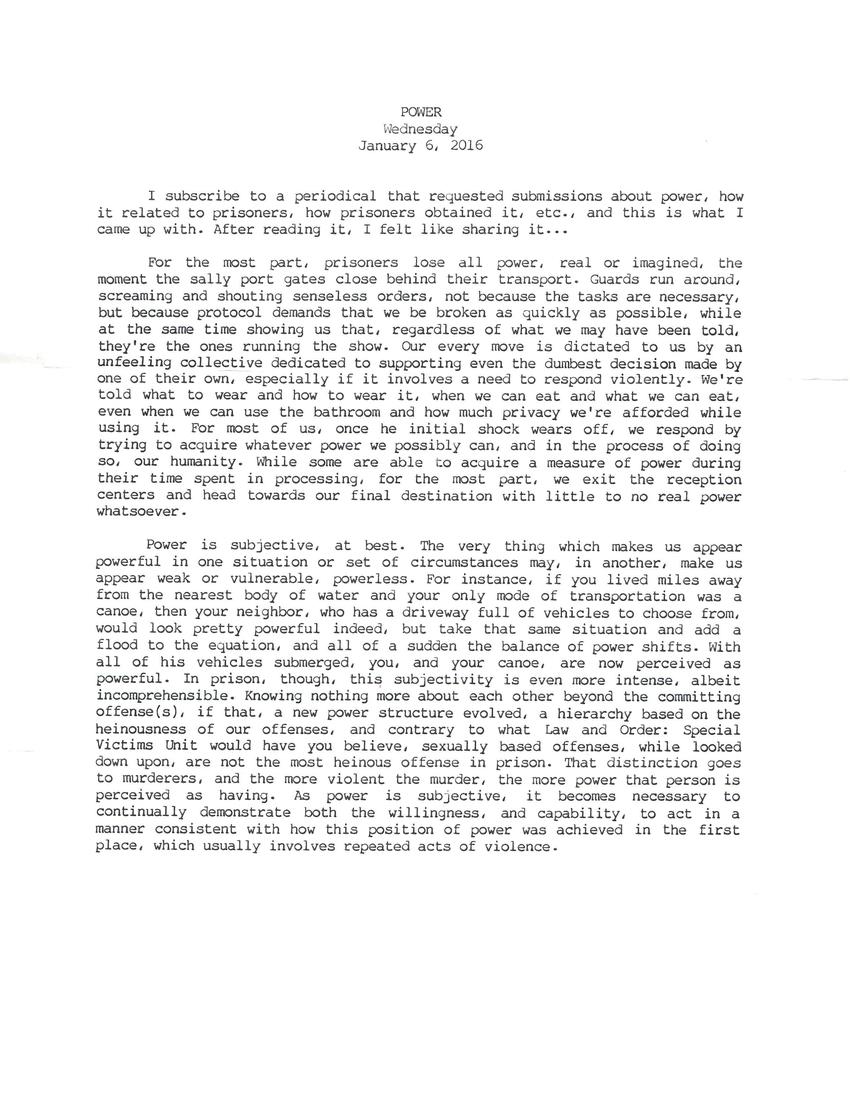
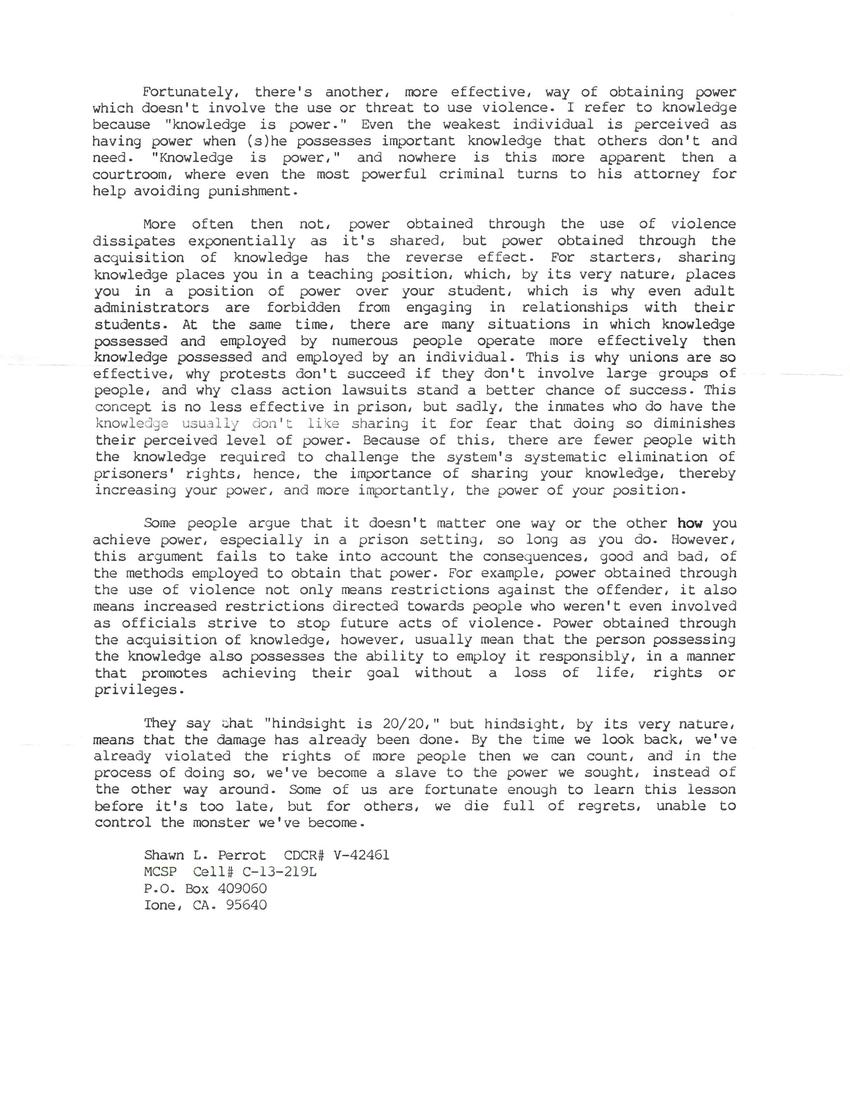

Replies (2)
I own an object that belonged to an old friend and to me it still holds memories and power. It is an unassuming object found in almost every household. To most it means nothing beyond it's usefulness. But to me it holds the memory of a friend. Somebody who had power over me. Somebody who was kind and listened. Somebody who I still don't know the whole truth about. Somebody who even after 13+ years, I'm not sure how I feel about.
I have read through your writings on here and in the boxes at home. You have power through your pen Shawn. Keep using it. And know that I keep an old blow dryer just because it holds some memories.
I hope this finds you well.
Your old friend,
Shea